Trump and Vance’s “Pro-Worker” Rhetoric a Cover for Tech Billionaires – Jonathan M. Katz
During the hyper-masculine clown car that was the Republican National Convention, Trump and his VP nominee, J.D. Vance, spewed absurd anti-migrant accusations and supposed pro-worker policies. Journalist and author Jonathan M. Katz breaks down the reactionary rhetoric of MAGA Republicans and argues that Vance’s populism is anything but worker-friendly, given his well-established ties to Silicon Valley.
Talia Baroncelli
Hi, I’m Talia Baroncelli, and you’re watching theAnalysis.news. I’ll shortly be joined by journalist Jonathan M. Katz. We’ll be speaking about Trump’s and J.D. Vance’s speeches at the Republican National Convention last week. We’ll also get into J.D. Vance’s supposed populism and his thoughts on workers.
If you’d like to support the work that we do, you can go to our website, theAnalysis.news, hit the donate button at the top right corner of the screen, and make sure you’re on our mailing list; that way, you’re always up to date every time a new episode is published. You can like and subscribe to the show on YouTube, share the show with your friends and family, and also listen to us on podcast streaming services such as Apple or Spotify. See you in a bit with Jonathan M. Katz.
I’m very excited to be joined by Jonathan M. Katz. He is a journalist and runs the newsletter The Racket. He has written several books, including Gangsters of Capitalism: Smedley Butler, the Marines, and the Making and Breaking of America’s Empire. He also reported from Haiti during the 2010 earthquake and wrote a book on it called The Big Truck That Went By. He has experience reporting on the UN mission, which caused a cholera outbreak, and on the multinational corporations that stood to profit from the humanitarian relief effort there.
So thanks so much for joining us today, Jonathan.
Jonathan M. Katz
Yeah, thanks for having me.
Talia Baroncelli
You and I both watched the RNC and the speeches that were given at the RNC, at the Republican National Convention, and I think it was a very hypermasculine, over-the-top convention. We saw Hulk Hogan, the infamous wrestler, ripping off his clothes to show a shirt that said “Trump, Vance.” That was quite entertaining and bizarre.
Some people are saying that the first part of his speech was more conciliatory, and then the rest, the remaining 64 minutes— it was a really long speech, it was over 90 minutes— but the rest of it was more his old Trumpian self, incredibly divisive. What do you make of Trump’s speech? We can also get into Vance’s speech where he accepted the VP nomination.
Jonathan M. Katz
Yes. I watched all of Trump’s speech. It was an hour and 30 minutes, by far the longest speech in televised convention history by a mile. He had held the previous record and bested it by 20 minutes. He bested it by the length of Joe Biden’s acceptance speech at the 2020 Democratic Convention.
Coming in, his team had tried to tell everybody that it was going to be a unifying speech, that he had been chastened by his death, the assassination attempt that had happened just a couple of days earlier. That lasted for three seconds. Not even. It was a wild speech, just completely unhinged. Trump just ripping and saying things that were crossing his mind. He made a reference to the late great Hannibal Lecter, this knowing reference. But he engaged in the same demonizing, xenophobic, hateful, discriminatory agitprop that he had always done. The only thing that was new since the shooting was an amped-up self-regard and basically declaring that he was the anointed savior, that God had saved him personally. It was a providential moment that he had been saved for the purpose of leading the country, becoming its absolute leader again.
Talia Baroncelli
Well, just based on what he was saying, you would assume that most of his followers are working-class white people, but in fact, there are quite a few people of color. Black for Trump support him, Hispanics and Asians. He even did say that he was trying to extend his hand to all Americans, whether they be Democratic, Republican, Black or White, Hispanic or Asian. Of course, Trump is not being genuine here. I’m assuming he’s a very racist person himself, but the rhetoric he’s using is trying to appeal to a much broader demographic. How do you account for that multiracial, multi-ethnic support?
Jonathan M. Katz
Yeah, it’s very interesting. I’ve written about this before. What Trump is trafficking in, and this is a concept that is foreign to a lot of Americans, and so it doesn’t really scan for people. But he’s basically positioning himself as the head of a multi-ethnic fascist movement. We saw this emerge in his first term. There, by the way, there are many echoes and references to this all around the world. You can read a lot of scholars about global fascism and global populism, like right-wing populism.
Federico Finchelstein is a really great one. He is Argentinian himself, but he has written a lot about the multi-ethnic, multinational varieties of fascism that are united by different ethnic-chauvinisms and a shared value of authoritarianism and internalism. A lot of them paper over their ethnic differences through a shared gender chauvinism, which now includes transphobia.
There are a lot of examples of this that we’ve seen all over the world for many, many decades. But Trump really found himself leaning into that, I think in the aftermath, actually, of the Nazi rampage through Charlottesville in 2017, the one that Trump and his supporters protestations to the contrary, Trump one-hundred percent said that Nazis who marched in Charlottesville were very fine people. They were very fine people on both sides, the two sides being Nazis and the people who were counter-protesters who were there to protest against the Nazis.
What happened in the aftermath of that event in 2017 was that the Nazis who marched in Charlottesville, Virginia, were discredited. They came out of that episode looking really, really bad. They killed somebody. One of the neo-Nazis plunged his car, his Dodge, into a crowd of counter-protesters, injured a dozen or so people, and killed Heather Heyer, who was 32 years old at the time.
In the wake of that, the people who had set that march up, Richard Spencer, who was a notorious neo-Nazi, and Jason Kessler, who was another one who was one of the primary organizers of that event, were very, very severely discredited. It was not clear coming into it, that was what was going to happen. That was a test case. Richard Spencer had held a rally in Washington right around the time that Trump won the election, I think between the election and the inauguration. He had a bunch of people standing in the room, and they all threw up Hitler salutes and yelled, “Hail Trump.”
The idea of that rally in Charlottesville, Unite the Right, was that it was going to bring together these different elements of the far-right, neo-Nazis, the Klan, and also MAGA, also the Trump-right, and it was going to pull them all together. But because it was such a debacle, because it looked so bad on television, because Americans, for all of America’s blind spots and historical amnesias and whatever, the one thing that Americans know how to recognize immediately is a swastika. They know what that is, they know what it represents, they know it’s that, they have no illusions about it.
Charlottesville was a test case where they were going to be like, we’re going to put a swastika next to Trump, to Trumpism, literally wearing MAGA hats while Hitler saluting, and we’re going to see how this plays. It didn’t play well. So after that, Trump and even the far-right, fascist street-fighting cadres that emerged in the wake of that are multiracial. The Proud Boys being the best example. The Proud Boys, they’re a neo-fascist militia. They are a street gang, essentially, but they consider themselves “Western chauvinists,” as opposed to white supremacists. They’re upholding elements of white supremacy, but they do it in this very weird, multi-ethnic format, which brings together people, for instance, like Cuban exiles.
Having reported for many years in the Caribbean, I can tell you that the Caribbean has a really weird relationship with race, where people who would present as being black in the United States are themselves white supremacists in a Caribbean context. The Proud Boys end up supplanting the street fighting cadre art of Trump’s movement.
On January 6, 2021, during the assault on the Capitol, that ended up actually being led in many cases by members of the Proud Boys. Trump, infamously in his debate with Joe Biden in 2020, is asked to denounce white supremacy and to denounce the Proud Boys. Instead of doing that, he says to the Proud Boys, “Stand back and stand by.” Then the Proud Boys print T-shirts that say, stand back and stand by.
That’s a long explanation, but all that is to say that, first of all, there’s nothing inherent about having some members of non-white groups, other ethnic groups, participating in a movement that makes it not white supremacist, and certainly not, as the Proud Boys call it, “western chauvinist.”
Then Trump also broadens his appeal even farther to other Conservatives, other reactionaries in those groups. His idea is that he is going to unite them in their common bigotries, whatever their bigotries are. He can pair himself with far-right anti-Semites, and he can also pair himself with far-right reactionary Jewish groups whose reactionism is hardcore Kahanism, hardcore Zionism, hardcore Islamophobia, and hardcore anti-Black racism. Then he can also ally himself with Black conservative nationalists.
One of the ways that Trump has been able to do it throughout his political career has been to target each of these groups individually, even though all of these targets contradict one another and make them all loyal to him. That’s what I see in that.
Let’s not have any illusions here. This could be a successful strategy. It does not strain credulity to imagine that he will be able to pick off some number of Black voters, some number of Latino voters, etc, by appealing to them in their personal bigotries, their personal reactionary tendencies. At the same time, it’s very important not to lose sight of what this is and what he is doing and get lost in a very, very basic and very surface-level idea that because there are some Blacks for Trump, as they call themselves, because there are some Hindu Nationalists, Hindutva for Trump, that that means that the MAGA project, writ large, the Project 2025 project as it’s envisioned by the Heritage Foundation, that that project is not ultimately built on a foundation of what you can only describe as white supremacy.
Talia Baroncelli
What do you say to the argument, though, that the lens of white supremacy doesn’t fully explain Trump’s rise that there are, of course, right-wing, fascistic, evangelical, Christian groups which have an outside influence over Trump. Of course, there are MAGA supporters who are blatantly racist and might even have potentially fascistic ideals. That is not something we can dispute, but there were indeed people who were so disillusioned by the democratic establishment that they turned to Trump in 2016, following the subprime mortgage crisis in 2008 and the ensuing economic problems and the foreclosures. What do you say to that argument?
Jonathan M. Katz
Yeah, well, first of all, we should clarify that the subprime crisis happened under George W. Bush, who was a Republican. But of course, the Republican Party effectively doesn’t exist anymore.
Talia Baroncelli
But a lot of the foreclosures were under Obama.
Jonathan M. Katz
Yeah, no, I understand. I would say a couple of things. There have been many, many studies done about this question over the last eight years. Generally speaking, when you divide voters on the basis of class, for instance, certainly in the 2016 election, I’m very conversive with those numbers. Lower-class, poor voters of all races tend to decide with Hillary Clinton and not with Trump. It’s not that poor people who are disillusioned are necessarily turning to Trump, or at least necessarily were turning to Trump, the economic anxiety. It’s that a very specific subclass of basically small business owners, but wealthier small business owners. You might call them, in a certain class analysis, the petty bourgeoisie. People who own chains of car dealerships, restaurant franchisees, also people who had… You would go to a place like the Rio Grande Valley in Southern Texas, which has shown a marked tendency, in contrast with other areas that are predominantly Latino, to have relatively more support for Trump. It’s not a majority, at least the last time I’ve seen those numbers, but it is a significant part of the population. But even then, it tends to be the people in that population who are wealthier and who have a little bit more power.
Another way to think about it is you’ll have a rural county, and the sheriff and the local small business elite tend to support Trump. They see Trump as being their defender and their bulwark against the people who they feel are trying to take advantage of them, which in their minds are both their poor clientele as well as the government, as well as disconnected elites who are in Washington or Wall Street or whatever.
It’s a little bit more complicated than that. It’s not so much a question of economic anxiety versus racial anxiety. It’s more a very, very specific economic anxiety that is also very, very cultural. It’s very, very culturally coded. The best word to describe it, and it’s a word that I’ve used, and I guess it’s a little bit jargony, but it’s reactionary. These are people who have something of a foothold in society.
You see this, for instance, with, again, it’s not a majority by any stretch of the imagination, but you have some people who are immigrants from Latin America. Their immigration status is not in question. They’ve either regularized it or they came legally or whatever. You will see them being interested in Trump. There are a number of things about the Trump and the Trump right, that can be appealing to them. Conservative values, religious appeals, and stuff like that. But it’s also an anxiety about losing a tenuous place in society. They feel that they’re afraid that people who are poorer than them, people who are undocumented, people who are trying to come to the United States now, etc, that they are going to get lumped in with those people and that they’re going to get dragged down with them. It’s a natural and almost logical reaction in some of those cases to turn to the guy who’s like, I’m going to protect you. I’m going to protect you from the hordes and from social change. Because if you feel that your position is very tenuous, then facing any social change can be very, very threatening.
This is one of the reasons why anti-trans appeals work on a certain subset of the population. Because people are like, I feel very tenuous in my position in society, and I see things that seem so fundamental to me as a gender binary being challenged and changing, I’m going to go with the person who promises to stop that change. I think you see those things. But you really have to emphasize you can’t get around the fact that when you’re talking about people who are resistant to change in a society that is built in a very fundamental way on class dominance, of an upper class exploiting lower classes, and on white supremacy, and on patriarchy, and all of these other things that are buzzwords, but they’re all true, then, of course, if you’re resistant to any change, and the leader of your political movement is trying to disrupt and trying to stop those kinds of change, you’re going to by definition, be re-up holding and re-establishing those kinds of inequalities.
Talia Baroncelli
The article that you wrote right after Trump’s RNC speech talks about this mass deportation logic. A lot of people at the RNC were holding up these posters saying mass deportation. A lot of these absurd ideas haven’t actually been properly challenged by the Democrats. Joe Biden has leaned into them, thinking that he could get some Republican voters to vote for the Democratic Party by arguing for having hard border-type policies.
But I think one thing that Trump is talking about is deporting something like 20 million people, which would actually entail stripping people of their citizenship. It would entail stripping migrants who came into the United States and then became naturalized and gained citizenship. It would require stripping them of their citizenship and perhaps their family’s citizenship. That’s obviously really extreme, but that, to me, seems to illustrate a different type of othering that’s going on in his rhetoric where it’s like, okay, if you’re from the U.S. and you believe in America first, regardless of whether you’re Black or Hispanic, or if you came in through a legal channel, or even if you didn’t come in through a legal channel, but you made it somehow, then you’re okay as long as you espouse our values, our right-wing populism. It’s not really populism, but it’s pretending to be so, or it could be even characterized as fascist. Then you’re okay, and you can be part of our tent or whatever, our party. But if you’re coming from Venezuela or another country, and maybe you’re a socialist, or you’re threatening what we’ve established, then you deserve to basically die at the border. It seems like there’s something else going on there with the rhetoric, and that explains how people feel like they’re threatened or they’re threatened by this change. Maybe that’s why they’re buying into this mass deportation nonsense.
Jonathan M. Katz
Yeah, people can convince themselves that they will be safe. I think that’s part of it. That’s also been part of the story of Trump throughout, which is a very typical authoritarian story. Even within the Republican elites, even people within the Republican Party establishment who have convinced themselves, “Well, I’m okay. I will join with Trump in denouncing this other person, purging this other person from the party.” But to use The Onions very apt phrase, which has become a cliché, the leopards aren’t going to eat my face. Was that The Onion or was that somebody on Twitter? It doesn’t matter. I don’t know. You know what I mean? The idea is that I will be safe. It’s a very bad bet. It’s a very bad bet.
As you said, so Trump at the convention, also in the speech in Butler County, Pennsylvania, right as the shooting happened. Right as that happened, he was talking about deporting, as you said, 20 million people. The highest estimates that I’ve seen from the federal government, from even immigration policy watchdog, the number of undocumented people in the United States, unauthorized people in the United States is like 10 or 11 million. That includes visa overstays, and the majority of those people have been in the United States for over 10 years. The idea that he’s going to mobilize a deportation of 20 million people, if you take that literally, then that means that he has to either be planning to strip people of their citizenship or of their legal residence status. He’s also threatened to deport people who participated in the campus protests against the genocide in Gaza. He would use that power to deport or round up or whatever.
He and Stephen Miller, his anti-immigration advisor, have talked very openly about detention camps. Concentration camps are another name for that. They’re very open about the fact that they will use this to round up political enemies. They will use it to hurt anybody who they feel is a threat to them or an annoyance to them in any way.
I have also heard, I’ve seen, in 2019, I think it was 2019, I went to El Paso to visit one of the detention centers, one of the concentration camps, at which there were, actually a couple of them, but Clint was a specific one that I went to near El Paso. There were a number of people there who were pro-Trump protester, who were there to protest against… they were counter protesting against people who were protesting the facility. The majority of them were of Mexican descent. Some of them were from families that had been in El Paso since the Mexican-American War, 1846-48. Some of them probably had family that preceded it. They were there from when Texas was Mexico. But they don’t think that they will be hurt by this.
The thing is that you see this in any autocratic movement is that the circle keeps having to definitionally get smaller. A movement like MAGA, a movement like Trump’s, they need an enemy to always be fighting against. If they’re able to defeat their outermost enemies, trans people, the “woke” whomever, they will then move in. You see this also with Trump and his personal dealings. They will ultimately move into people who are less perfect, less of their ideal. That’s a time when you’ll see white supremacy come back to them.
Talia Baroncelli
Right. Trump is saying that most of the people coming in have criminal records or that they’re bringing in drugs, but a lot of people who are actually coming into the country are forced to get in where there isn’t maybe a fixed border, or there’s no border patrol. That actually is much more precarious for them. A lot of them lose their lives in doing so, and they’re avoiding or evading some of the main ports of entries. Actually, most of the drugs and stuff that’s coming in or fentanyl is through those ports of entries. There was just a lot of lies in his speech.
I do want to get to J.D. Vance because a lot of people are portraying him as this populace, someone who takes the interests of workers very seriously. But it seems like he’s actually supported by Silicon Valley, by Elon Musk, by Peter Thiel, who’s behind PayPal. Marc Andreessen at Horowitz, they’re big business people. They support what most people would characterize as little tech as opposed to big tech, so not Google or Facebook, but some smaller venture capitalist firms and defense contractors. They have said that they stand by Trump and Vance.
I was wondering if you could speak about J.D. Vance’s rhetoric. Just one thing that I should point out. When the Nazi Party started, it was started as the German Workers Party. There’s a history there of tying these fascistic beliefs to the rights of workers. But do you think that analogy applies in the case of Vance?
Jonathan M. Katz
Well, so the first thing to say about Vance and his ties to the Silicon Valley guys is that every job that J.D. Vance has had since Yale Law School, speaking of being an elite, was given to him by Peter Thiel. Peter Thiel funded his senatorial campaign in Ohio just two years ago. J. D. Vance is effectively a Peter Thiel creation. His rhetoric very much models that of Peter Thiel.
I saw just the other day, Vance cited Curtis Yarvin, who is a modern fascist writer. He describes himself as a monarchist. But his idea is that there should be an absolute ruler of the United States and that democracy is outmoded. Peter Thiel has also said the same thing, that he thinks that democracy is effectively [inaudible 00:27:56]. These are the people who are behind J.D. Vance. He does engage in what you might call somewhat populist rhetoric. He paints himself as being a pro-worker, pro-working class guy. This was the point of his book, Hillbilly Elegy.
Talia Baroncelli
Because he was born in Ohio, he had very poor parents and then moved to Kentucky, I think it was. So, he presents himself as espousing these Appalachian values and coming from nothing, essentially.
Jonathan M. Katz
Yeah, exactly. If you actually read the book or just a synopsis of it, the real point of Hillbilly Elegy is that working class people’s problems are their own fault. The problem is that they can’t fight their addictions, and they don’t work hard enough. If they would just grab themselves by their bootstraps and lift themselves up, then everything would be great, which is a very old idea. It’s a very traditional Republican Party idea.
I think he’s criticized Amazon in the past. The Trump wing of the Republican Party, which is now just the Republican Party, obviously sees Jeff Bezos as an enemy of theirs, so I don’t think it’s hard for them to do that. Look, you can’t criticize Amazon or Jeff Bezos enough. I’m all on board with that, but I don’t think that’s a proof of working class ideals.
The thing is that Vance, for all of his rhetoric, doesn’t really support organized labor. He doesn’t support the PRO Act, for instance, which is the most important piece of labor legislation that has been before Congress. His idea, and he and Josh Hawley are two peas in a pod on this, they seem to back a vision of employer unions. They like sector organizing, which is good. That’s an important piece. Basically, instead of having each individual company go on strike, you could have entire sectors collectively bargain. But without supporting something like the PRO Act and also by signing up for the Trump ticket, I mean, Donald Trump, his National Labor Relations Board, was one of the most anti-worker in history. Many people in his coalition want to destroy the NLRB, including Elon Musk, by the way, speaking of Silicon Valley guys who support Trump and Vance. That has been, at least in the past, friends with Peter Thiel. I don’t buy it.
The other thing that I would say that people should watch out for is when you’re talking about immigration, when you’re talking about the uses of migrant labor in this country, a lot of the U.S. economy, the domestic economy, is based on the exploitation of migrant laborers. If you get rid of undocumented or precariously residing migrant laborers, they are going to be replaced, and they’re not going to be replaced by people getting $15 an hour with full benefits and being allowed to form unions. They’ll be replaced by whoever the most vulnerable workers are, which will probably be incarcerated labor.
While there is a long history in the United States of labor, the labor movement backing both protectionist and, in some ways, anti-immigration policies, the fact that when you look at the sweep of Vance’s positions, where he’s against some kinds of capital, but very much in bed with others, he is for certain kinds of organizing, but not for the PRO act, not for things that would actually make organizing more effective and more open. He’s joining the ticket of a guy who effectively wants to destroy or end the NLRB. Then you put with all of that the fact that he wants to be part of this ticket that’s going to conduct this huge mass deportation, I don’t see a good future for working people coming.
Talia Baroncelli
He’s also incredibly anti-abortion. He also gave a speech at the Teneo Network, which is run by the legal activist Leonard Leo, who is also behind the Federalist Society. There’s obviously a lot there.
Before we end, what do you think his actual policy will be on war? Because he’s said things like he’s opposed to sending weapons overseas because he doesn’t think it would address manufacturing issues at home in the United States. He wrote to the Washington Post and said, “$100 billion foreign aid package is not pro-worker manufacturing policy.” Do you think that he would go back on that if Trump were to be elected and he’d be the VP?
Jonathan M. Katz
I think he would go back on anything that was convenient for him to go back on. The thing about Vance’s war policy, and it’s aggrandizing to say that he even has a war policy. He’s been a senator for two years. I don’t think he’s done anything on foreign relations of any kind, except for, I guess, speaking out here and there against support for Ukraine and Israel. He’s also very much a China hawk. I think he very much seems to be of a piece with, until recently, until he was fired, the Tucker Carlson wing of the Republican Party, and the Peter Navarro wing of the Republican Party, which is basically that they are isolationists or anti-war, maybe when it comes to Russia. They’re very sceptical of Israel in ways that sometimes dovetail a little bit more with actual anti-Semitism than do other forms of anti-Zionism.
Talia Baroncelli
Not in the sense of supporting Palestinian rights.
Jonathan M. Katz
Exactly. Not at all. Because they’re fully on board with Islamophobia as well. They are hawks when it comes to China. I don’t know exactly how all of that would play out. Among other things, if you look at the international scene now, Russia and China are becoming closer allies, especially as China supports Russia’s war effort in Ukraine. I don’t know if there would be different tendencies that would come out of that alliance.
Suffice it to say, what we have seen for the last four, eight years has been a lot of people on the right, on the American political far-right, the establishment or the elite far-right, saying that basically we’re paying too much attention to Russia and we should be paying more attention to China. We should go to war with China, basically, instead of Russia. I see that with Vance as well.
He made a speech recently at the National Conservatism Conference, which is just another fascist gathering. He talks about that. He talked about China, and he put a boilerplate line in there where he was like, “Well, I don’t really want to go to war with China. I just want to prepare for war with China. I just want to arm ourselves and invest in the military for war with China.” I don’t see that as being–
Talia Baroncelli
Don’t send the weapons to Ukraine because you might need them when Taiwan is invaded.
Jonathan M. Katz
Exactly. Let Vladimir Putin have Ukraine. We should be allies. For many years, and again, I don’t know how recent moves on that front would affect this policy proposal, if you can call it that. But for many years, the Tucker Carlson set was basically saying, “We should ally with Vladimir Putin against China.” We should have a world war, but it just should be Russia and the U.S. on one side and China on the other. Again, everything’s scrambled. But yeah, I don’t buy it. I don’t buy him as an anti-war candidate or a critic of the military-industrial complex at all. I just think he wants the money spent on things that he thinks are a better bet for him, politically and personally.
Talia Baroncelli
Well, we’ll have another episode with you on the military-industrial complex, given that you wrote a book, Gangsters of Capitalism on Smedley Butler, who was a U.S. Marine, who also participated in the U.S.-Spanish-Cuban War, and then who was very critical of U.S. Empire and war. I think it would be great to have you on again and speak about that.
Jonathan M. Katz, thanks so much for joining us. You can find Jonathan at theRacket.news.
Jonathan M. Katz
Thank you.
Talia Baroncelli
I hope everyone goes and checks out your newsletter. Thank you for watching theAnalysis.news. If you’d like to support us, you can go to our website, theAnalysis.news, and sign up for our newsletter as well. See you next time.
Podcast: Play in new window | Download
Jonathan Myerson Katz is an American journalist and author known for his reporting on the 2010 Haiti earthquake and the role of the United Nations in the ensuing cholera outbreak.
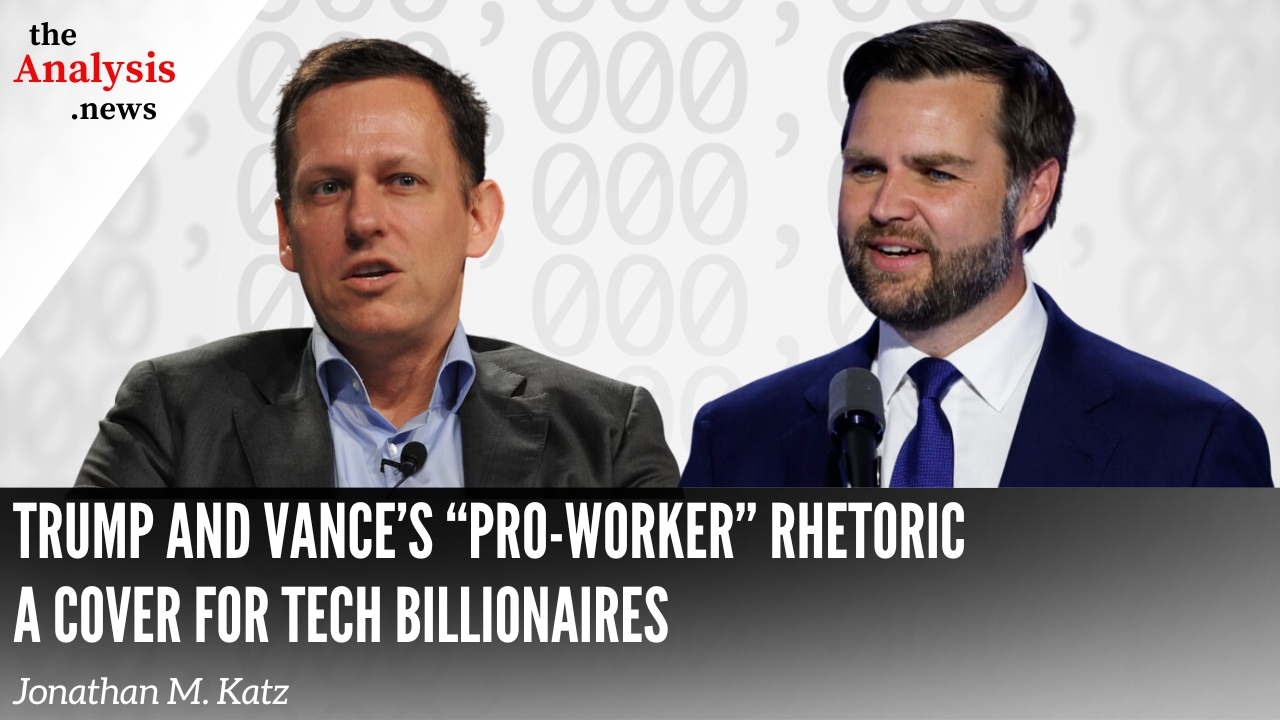

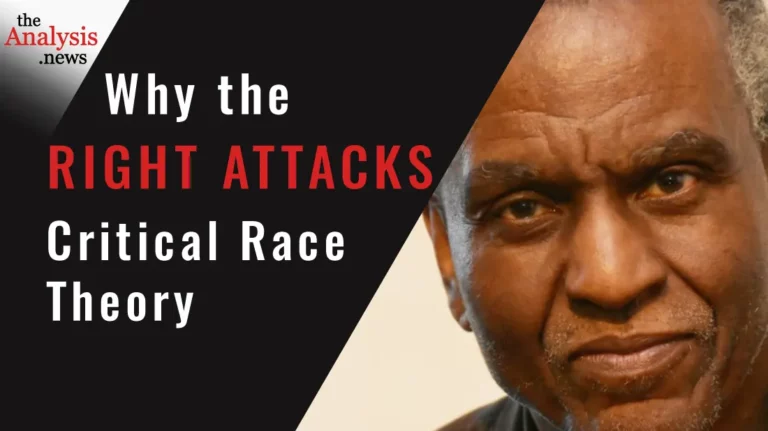
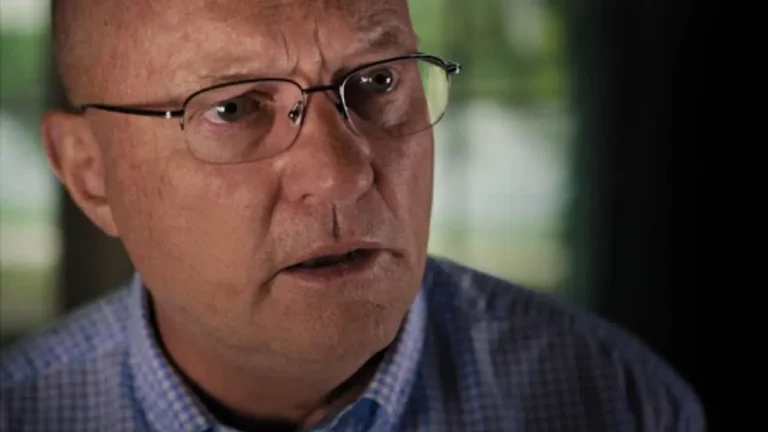
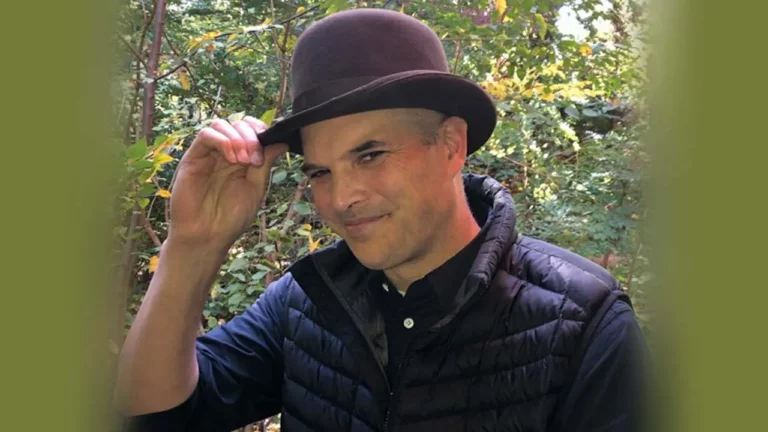
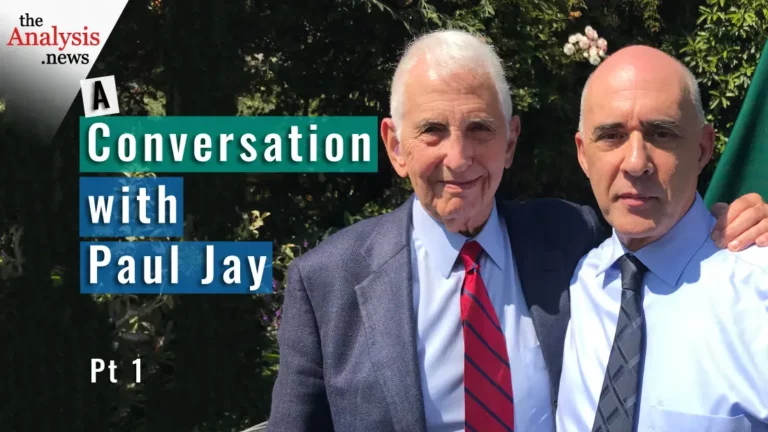
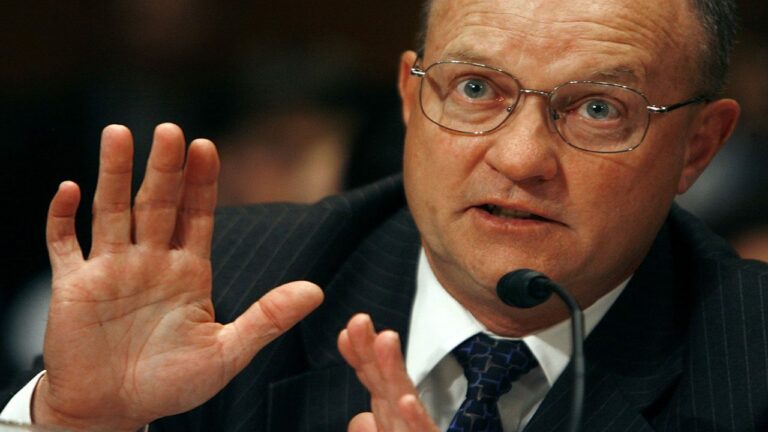
So when are you going to do an expose on Harris’ ties to Big Tech from whom she is getting lots of money – Big Tech loves her, and it will be interesting to see if Lena Khan is fired – one of the few good appointments Biden made …